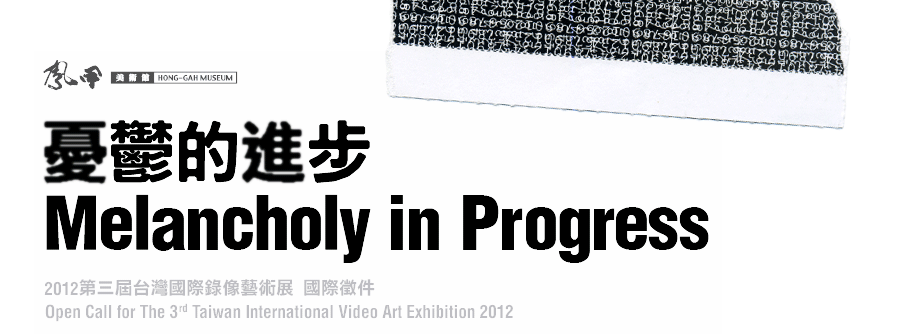 |
| |
憂鬱的進步
鄭慧華、郭昭蘭
繼「居無定所?」回應全球金融風暴下的不安與「食托邦」透視人類「食」的文化,第三屆台灣國際錄像雙年展將以「憂鬱的進步」為主題,試圖以另一種角度探討現代社會所追求的科技、快速、移動、成長等等「進步」概念。
以進步之名,我們經歷了工業革命、資訊革命至今日科技產業的勃發,生活型態從農業聚落過渡到城市都會,現代生活基礎無一不構築於「進步」的要求上。進步滿足人們種種生存與感官的慾望,從日常生活中的大量生產、交通運輸、通訊傳播到生化醫療技術…,「進步」從各個不同的層面將生命包圍,我們置身於進步所製造出的速度感與前進感氛圍之中,引我們朝向讓生命會更好、明天會更好的「光明面」。
例如人與人的通聯,從烽火、狼煙、信鴿時代到郵政時代,從郵政時代又進入到網路與無線通訊時代,這個過程歷經數千年。資訊時代來臨,科技進步愈加飛快,十年前,我們上網還是用電話播接,如今這已是一個老舊過棄而不被再提起的技術,現在所有人都用ADSL、無線、光纖。科技進步的背後,我們要的是「快、還要更快」、「多、還要更多」、「成長、再成長」。於是,「進步」本身也成為現代社會的慾望,而且這個慾望永遠無法滿足,「進步」的追尋沒有終點,沒有盡頭,它的「無法滿足」也漸漸成了一種強迫症。同時,無法停息的追求進步讓人時時處於不滿足的隱憂之中,漸漸成為一種無以名狀的「憂鬱」狀態,而「憂鬱」意味著的焦慮、不安、失落、退縮,也可能成為一種病症,它往往不見容於「進步」的概念而必須被隱藏,甚至被排除。關於追求進步的「憂鬱」是一種集體心理狀態,也指涉有形的,被遠遠抛在快速進步和技術發展後頭的大量廢棄品、廢棄人、廢棄地區、廢棄文化、...。憂鬱這項進步的產物,使「進步」成了一種悖論。
然而,憂鬱是否也是在面臨困頓時的一種自我療癒和自我保護、自我檢視的機制?它致使我們能夠以站在「進步」的對立面,重新去看待所謂「進步」的實相是什麼,甚至,反過來將「進步」視為一種病癥和去肯定這種自我治療的可能性。
人類的「進步」究竟是一幅怎麼樣的面貌?科技的進步是否等於人類的進步?今日所認為的「進步」如何包圍我們日常生活?人們對「進步」的態度又是如何?這些都是這個展覽所欲著墨的總體面向。此外,本展也試圖詢問,如果憂鬱是進步的病癥,那是什麼樣的狀態?應如何療癒?如果現在所謂的「進步」令我們憂鬱,那是否還有其他「進步」的可能?我們能否回望這一切被加速耗損了的生命個體與自然,並檢視其中潛藏的險境與危機?

Melancholy in Progress
Amy Cheng, Jau-lan Guo
Following the 2008 theme Dwelling Place which responded to the global financial crisis, and 2010 Eattopia exploring food culture, this year’s Taiwan International Video Art Exhibition presents Melancholy in Progress to examine the pursuit of progress and its various manifestations in modern life, including medicine, sanitation, technology, speed, mobility and growth.
In the name of progress our world has transformed from agricultural settlements to urban clusters through industrialization, technology revolutions and the recent info-tech boom. Nothing in modern life is not built through the course of progress, which fulfills both our basic needs and our sensual desires. Overwhelming changes in mass production, transportation, communication and bio-medicine control every facet of our life. In today’s fast-forward lifestyle, we are led to believe that life will be better and brighter day by day.
Taking communication as an example, it took thousands of years for humans to develop communication by fire, smoke signals, and pigeons, and then after centuries of using postal delivery systems, we have entered the age of Internet and wireless technologies. The higher speed of information dissemination as well as the development of technology, and with the advent of ADSL, Wi-Fi and fiber-optic technologies, the use of dial-up modems to connect the Internet is an antiquated, unthinkable idea today.
Behind the faster and faster communication, more and more materials and continual growth, is the will to make progress, a shared goal of every modern society that nonetheless is never satisfied. The world has gradually developed an obsession with progress, and no one can escape from anxiety during the addictive pursuit of progress. This anxiety becomes indescribable melancholy, and its syndromes include feeling vexed or lost, and retreating from society. Unfortunately, these syndromes must be repressed since they are contradictory to the concept of progress. The melancholy which results from progress reflects a collective mindset which agrees to leave behind some people, some objects, some places and even some cultures that are thought not presentable in the collective yearning for progress. And these abandoned people, objects, places and cultures constitute the greatest paradox of progress.
Is there a chance we can defend ourselves, look into our plight, or even heal ourselves with melancholy? This exhibition’s effort to find the truth of progress lies in confronting such an illness before confirming possible remedies.
What is the truth of progress? Is the advancement of technology equal to the advancement of humanity? How does what we believe is progress dominate our life? How are we supposed to respond to the demands of progress? This exhibition explores these issues, including the diagnosis and possible treatments of melancholy caused by progress.
At last, if the progress we pursue is the cause of our melancholy, is there a choice other than progress? Furthermore, will the answers to these questions be discovered through the risks and crises inherent in over consumption and the unreasonable sacrifice of nature?

|
|
|







